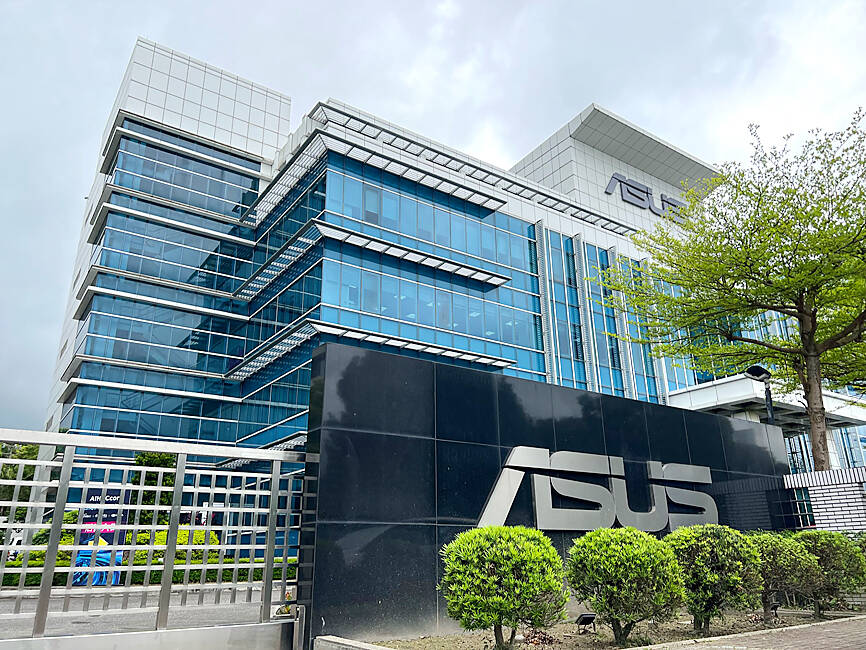Asustek Computer Inc (華碩) yesterday said it is building a server assembly line in the US to facilitate shipments of the large machines to customers in the region, as it seeks to tap into the rapidly growing artificial intelligence (AI) server market.
The efforts came three months after the company unveiled a grand strategy to accelerate its expansion into servers and artificial intelligence of things (AIoT) to explore new growth engines to drive revenue and profit.
The company has set an ambitious target to grow its new server business by 500 percent in the five-year period to 2027.

Photo: CNA
Asustek on Monday said that it was on track to reach that goal, given its long-standing partnership with Nvidia Corp and its advantages in component sourcing.
The company has activated a special project to build server assembly lines in San Francisco to supply its US clients, given the challenges of shipping such hefty machines, Jackie Hsu (許祐嘉), co-head of Asustek’s Open Platform Business Group and AIoT Business Group, said in a statement, confirming Nikkei Asia’s report.
It is also considering building server assembly capacity in regions beyond the US, said Hsu, who also oversees the new server business.
Asustek said it has secured a significant amount of orders to supply AI servers to clients in Vietnam, India and Singapore, thanks to its partnership with Nvidia.
As the AI server business is still in its infancy, Asustek expects the business to account for a low-single-digit percentage of the company’s total revenue next year. The revenue contribution would increase to a double-digit percentage in 2025 based on the company’s preliminary estimate.
Separately, Lenovo (聯想) has filed a lawsuit in California federal court, alleging that Asustek has infringed its patent, Reuters reported yesterday.
Hong Kong-based Lenovo said Asustek’s Zenbook laptops illegally used four of its patents related to wireless communications, diagonal touchpad scrolling and a hinge that allows laptops to convert to a tablet configuration, the report said.
Asustek said it cannot comment on the lawsuit, but it would comply with the law to safeguard the company’s interests.

SEMICONDUCTORS: The German laser and plasma generator company will expand its local services as its specialized offerings support Taiwan’s semiconductor industries Trumpf SE + Co KG, a global leader in supplying laser technology and plasma generators used in chip production, is expanding its investments in Taiwan in an effort to deeply integrate into the global semiconductor supply chain in the pursuit of growth. The company, headquartered in Ditzingen, Germany, has invested significantly in a newly inaugurated regional technical center for plasma generators in Taoyuan, its latest expansion in Taiwan after being engaged in various industries for more than 25 years. The center, the first of its kind Trumpf built outside Germany, aims to serve customers from Taiwan, Japan, Southeast Asia and South Korea,

Nvidia Corp chief executive officer Jensen Huang (黃仁勳) on Monday introduced the company’s latest supercomputer platform, featuring six new chips made by Taiwan Semiconductor Manufacturing Co (TSMC, 台積電), saying that it is now “in full production.” “If Vera Rubin is going to be in time for this year, it must be in production by now, and so, today I can tell you that Vera Rubin is in full production,” Huang said during his keynote speech at CES in Las Vegas. The rollout of six concurrent chips for Vera Rubin — the company’s next-generation artificial intelligence (AI) computing platform — marks a strategic

Gasoline and diesel prices at domestic fuel stations are to fall NT$0.2 per liter this week, down for a second consecutive week, CPC Corp, Taiwan (台灣中油) and Formosa Petrochemical Corp (台塑石化) announced yesterday. Effective today, gasoline prices at CPC and Formosa stations are to drop to NT$26.4, NT$27.9 and NT$29.9 per liter for 92, 95 and 98-octane unleaded gasoline respectively, the companies said in separate statements. The price of premium diesel is to fall to NT$24.8 per liter at CPC stations and NT$24.6 at Formosa pumps, they said. The price adjustments came even as international crude oil prices rose last week, as traders

Taiwan Semiconductor Manufacturing Co (TSMC, 台積電), which supplies advanced chips to Nvidia Corp and Apple Inc, yesterday reported NT$1.046 trillion (US$33.1 billion) in revenue for last quarter, driven by constantly strong demand for artificial intelligence (AI) chips, falling in the upper end of its forecast. Based on TSMC’s financial guidance, revenue would expand about 22 percent sequentially to the range from US$32.2 billion to US$33.4 billion during the final quarter of 2024, it told investors in October last year. Last year in total, revenue jumped 31.61 percent to NT$3.81 trillion, compared with NT$2.89 trillion generated in the year before, according to